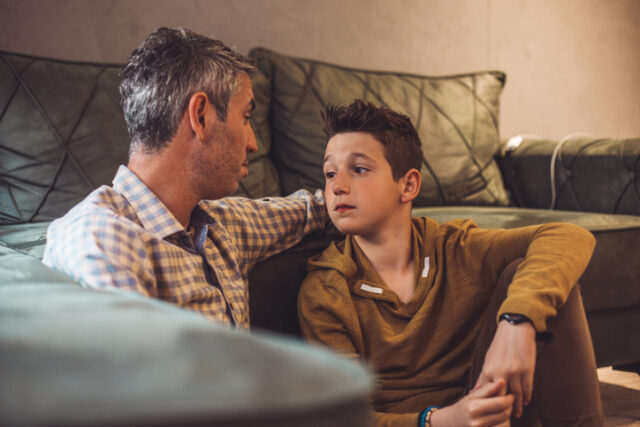In a lot of families, it feels like there’s an unspoken double standard when it comes to sons and daughters.

Boys are given more freedom, excuses are made for their mistakes, and they’re shielded from blame. Meanwhile, daughters are held to higher standards and expected to “know better.” These double standards can feel frustrating, unfair, and even soul-destroying. While every family dynamic is different, here are some common reasons why parents tend to defend their sons while having way less sympathy and understanding for their daughters.
1. They see boys as more fragile and girls as more responsible.

Some parents instinctively believe that girls mature faster than boys, so they place more responsibility on their daughters. If a son makes a mistake, he’s “still learning,” but if a daughter does the same thing, she “should have known better.” Such uneven expectations means daughters are often held accountable while sons get a free pass. After a while, it can create a frustrating pattern where girls feel like they always have to be the responsible one. They may end up taking on more emotional labour, problem-solving, or even acting as a second parent to their brothers, while their mistakes are met with criticism instead of understanding.
2. They excuse boys’ mistakes as “just how boys are.”

There’s still a lingering idea in many families that “boys will be boys,” which can lead parents to dismiss bad behaviour rather than correct it. If a son is messy, irresponsible, or reckless, it’s seen as part of his nature rather than a problem that needs addressing. Meanwhile, daughters are expected to be organised, well-behaved, and thoughtful from an early age. That isn’t just unfair — it can be harmful. When boys grow up without accountability, they carry that into adulthood, expecting others to clean up their messes. At the same time, daughters often feel the weight of extra expectations, making them feel like they can never afford to slip up.
3. They feel protective of their sons but expect daughters to be independent.

Parents may unconsciously see their sons as needing more protection, while daughters are expected to fend for themselves. That might come from outdated beliefs that boys are less emotionally mature or that girls are naturally more capable of handling responsibility. As a result, sons get more leeway, while daughters are expected to toughen up and figure things out on their own. Either way, the double standard can make daughters feel unsupported, especially when they need guidance or help. Instead of being given the same safety net as their brothers, they may be told to “just deal with it,” creating an emotional gap between them and their parents.
4. They fear sons will pull away if criticised.

Some parents, especially mothers, worry that if they push their sons too hard, they will withdraw or become distant. Because of that, they may be gentler with them, avoiding confrontation even when it’s necessary. With daughters, however, they may feel more comfortable being direct, leading to tougher discipline and higher expectations. While it might keep the relationship intact in the short term, it can create problems later. Shielding sons from accountability doesn’t make them more mature; it just reinforces the idea that they don’t have to take responsibility for their actions.
5. They have internalised gender roles without realising it.

Even in modern families, traditional gender roles can still influence how parents treat their children. Without meaning to, parents may see their sons as natural leaders and their daughters as caretakers, shaping how they respond to each child’s behaviour. Sons are given more freedom, while daughters are expected to be more nurturing and responsible. These ideas don’t always come from a place of malice — sometimes, they’re just ingrained habits passed down through generations. However, when left unchecked, they can create lasting resentment between siblings and make daughters feel like they have to work twice as hard for the same level of support
6. They subconsciously hold daughters to a higher moral standard.

Many parents expect their daughters to be more emotionally mature, considerate, and selfless than their sons. If a son is selfish or inconsiderate, it’s often brushed off as immaturity, but if a daughter behaves the same way, she’s criticised for being unkind or difficult. That leads to a cycle where daughters feel like they have to be “the bigger person” in every situation. In the end, that expectation can make daughters feel pressured to be perfect, always managing other people’s feelings while their brothers are allowed to make mistakes. It teaches girls that their worth is tied to how much they do for others rather than simply being themselves.
7. They don’t want to admit their son is at fault.

Some parents struggle with the idea that their son could be in the wrong, especially if they see him as a “good boy.” Instead of addressing his mistakes, they shift the blame onto someone else — sometimes even his sister. If there’s a conflict between siblings, the daughter may be accused of being bossy or overreacting, while the son is given the benefit of the doubt. That dynamic can be frustrating for daughters who feel like they can never win. No matter how valid their concerns are, they’re often dismissed or told they should have handled things differently, while their brother avoids accountability.
8. They worry their son will struggle more in the real world.

Some parents, particularly fathers, believe that their daughters will naturally succeed because of their maturity and resilience. In contrast, they may see their sons as more vulnerable to failure, leading them to defend them more fiercely. That belief can make parents overly protective of their sons while expecting their daughters to navigate challenges independently. While the concern might come from a place of love, it often results in an uneven playing field. Sons grow up expecting others to shield them from consequences, while daughters are left to figure things out on their own without the same level of support.
9. They fear social judgement more when daughters make mistakes.

In many cultures, there is more pressure on daughters to uphold the family’s reputation. If a son makes a bad decision, it’s often seen as a personal mistake, but if a daughter does the same, it can be viewed as a reflection of her upbringing. It leads some parents to be harsher on their daughters while defending their sons. Because of that, daughters may feel like they have to be extra careful in their choices, constantly managing how they’re seen. Meanwhile, sons often grow up with more freedom, knowing they won’t face the same level of scrutiny for their actions.
10. They relate to their son’s struggles more than their daughter’s.

Sometimes, parents naturally empathise more with the child whose experiences mirror their own. A father may see himself in his son and, as a result, be more forgiving of his mistakes. A mother might feel a sense of protectiveness toward her son, while being harder on her daughter because she expects her to be stronger. When that happens, it’s not necessarily intentional, but it can create an emotional imbalance in the family. Daughters may feel like they have to work harder for understanding, while sons receive support without having to ask for it.
11. They see their son as needing more encouragement and their daughter as needing more discipline.

Some parents believe that boys need more reassurance and confidence boosts, while girls need to be taught responsibility and resilience. Because of that, they might be gentler when correcting a son but stricter when dealing with a daughter’s mistakes. They may excuse their son’s failures while expecting their daughter to push through and do better next time. Needless to say, that can create an unfair dynamic where daughters feel like they’re constantly being judged while their brothers are given more space to figure things out. Instead of feeling supported, daughters may feel like they always have to prove themselves, even when their mistakes are minor.
12. They assume daughters will naturally take on more responsibility.

In many families, daughters are expected to step into caregiving roles without being asked. Whether it’s helping with younger siblings, keeping the house organised, or managing emotions within the family, these responsibilities often fall on them. Meanwhile, sons are not held to the same expectations and are given more freedom to focus on themselves. Because girls and women are often expected to “just handle it,” they might be blamed when something goes wrong, even if it wasn’t their fault. After a while, it can create an exhausting cycle where they’re constantly taking on extra burdens without recognition or support.
13. They think defending their son will help him become more confident.

Some parents believe that shielding their sons from blame will help them develop a strong sense of self-esteem. They might rush to defend him from consequences or insist that his actions were justified to prevent him from feeling discouraged. Meanwhile, daughters are often told to “toughen up” and handle criticism without complaint. While parents might think they’re protecting their son, it can actually do more harm than good. Boys who grow up without accountability may struggle to handle criticism as adults, while daughters who are constantly blamed may feel like they can never be good enough.
14. They unconsciously fear challenging traditional gender expectations.
 Source: Unsplash
Source: Unsplash Even in modern families, deep-rooted gender norms can shape how parents treat their children. Some parents may worry, consciously or not, that holding their son accountable will make him “soft” or that letting their daughter off the hook will make her “irresponsible.” These outdated ideas can cause parents to enforce different standards without realising why. Rather than questioning these patterns, parents may fall into them simply because that’s what they saw growing up. Breaking these cycles requires awareness and effort, but when parents recognise these biases, they can create a more balanced and fair dynamic at home.
15. They don’t see the long-term impact of their actions.

Parents may defend their sons and blame their daughters without fully realising how it affects their children over time. They may not recognise that constantly making excuses for one child while being strict with the other can create resentment, insecurity, and a strained sibling relationship. What feels like minor differences in treatment can leave lasting emotional effects. As children grow up, they often remember how they were treated compared to their siblings. If parents don’t make an effort to be fair and hold both sons and daughters accountable in the same way, they risk creating wounds that last well into adulthood. Acknowledging these patterns and making small changes can help build healthier, more equal relationships within the family.




